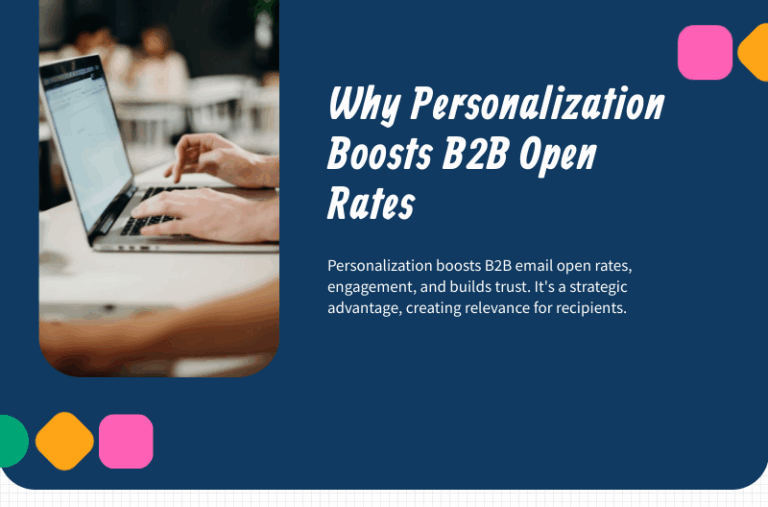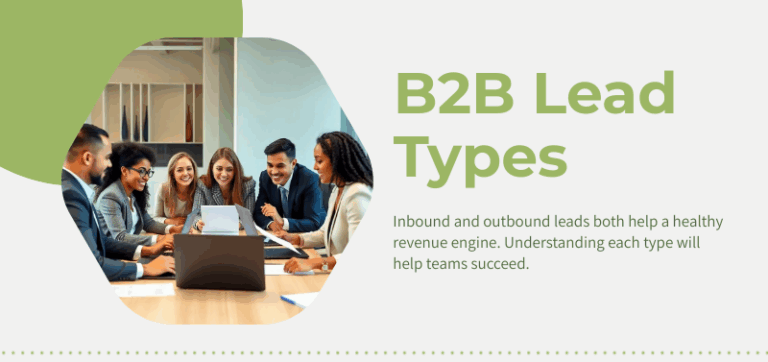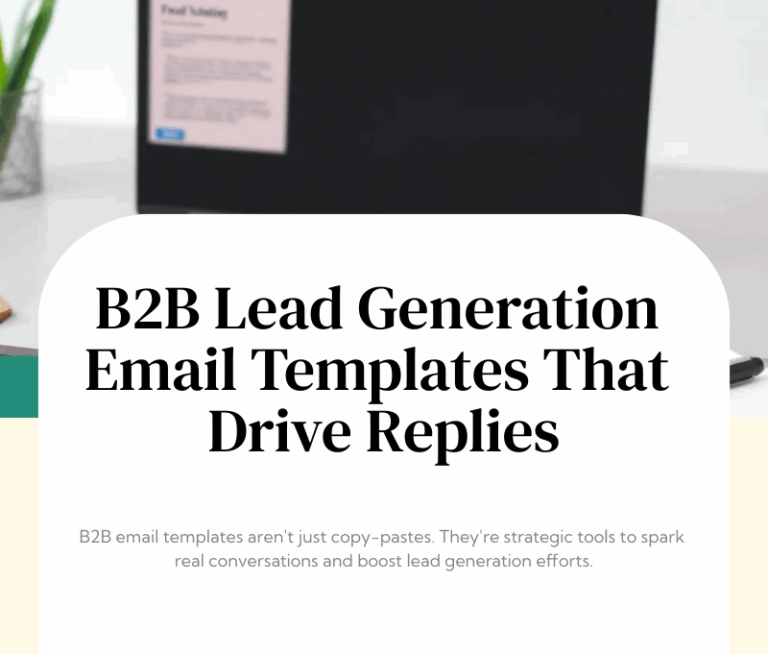
Marketing automation is no longer reserved for massive enterprises with sprawling marketing teams. Today, small and mid-sized businesses are turning to marketing automation agencies to streamline their marketing, drive consistent lead nurturing, and scale their revenue without ballooning overhead.
If you’re a small business owner or entrepreneur trying to break free from time-consuming manual campaigns and want a more strategic, automated approach to growth, this guide is for you. We’ll explore what marketing automation agencies do, how they help your business grow, and what you can expect when partnering with one.
I. What Is a Marketing Automation Agency?
A marketing automation agency is a specialized partner that helps businesses plan, implement, and manage automated marketing systems across multiple channels. Unlike traditional marketing agencies that focus on creative campaigns or media buying alone, these agencies bridge strategy, technology, and execution.
Core Functions of a Marketing Automation Agency
- Automation Strategy: Crafting a clear roadmap aligned with your business goals.
- Technology Enablement: Implementing and managing platforms like HubSpot, Marketo Engage, or ActiveCampaign.
- Workflow Design: Setting up automated sequences to engage leads and customers at the right time.
- Data & Analytics: Measuring performance and optimizing for conversion.
Why Marketing Automation Agencies Stand Out
- Specialized Expertise: Deep knowledge of automation platforms and CRM integrations.
- Scalability: Capable of handling complex workflows, segmentation, and campaign orchestration.
- Strategic Support: They don’t just “run tools” — they build a system that aligns with your revenue goals.
- Personalization at Scale: Deliver tailored messaging to different customer segments without increasing workload.
Example: A local real estate agency using manual email campaigns might reach 500 leads monthly. With a marketing automation agency, they can create segmented workflows and personalized follow-ups — reaching thousands, increasing open rates, and driving more conversions automatically.
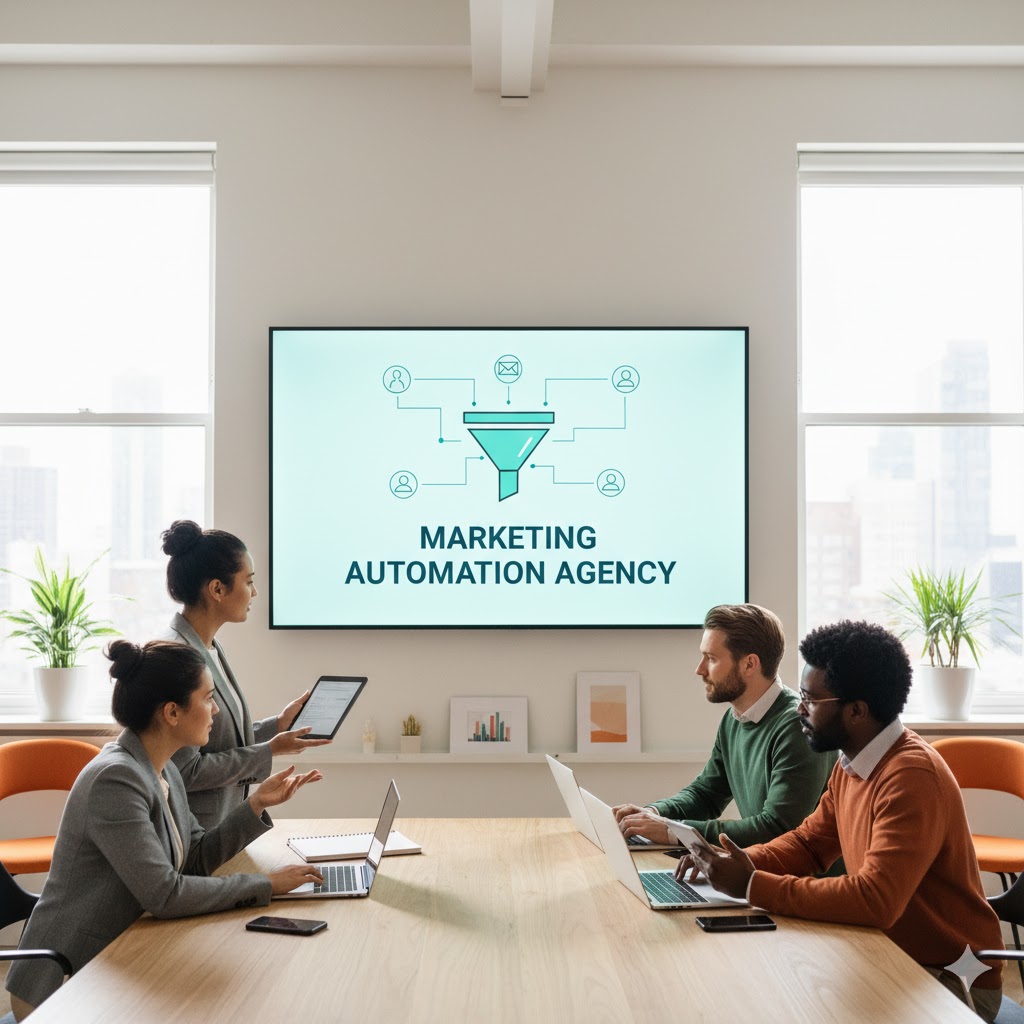
II. Why Businesses Need Marketing Automation
Many businesses start with a manual marketing setup — sending individual emails, tracking leads in spreadsheets, and manually updating customer lists. But as leads and campaigns grow, so do the inefficiencies.
A marketing automation agency helps remove these bottlenecks by setting up intelligent systems that work around the clock, ensuring every lead receives the right message at the right time.
Common Challenges Without Automation:
- Leads slip through the cracks due to inconsistent follow-up.
- Campaigns lack personalization, reducing engagement.
- Reporting is fragmented, making ROI hard to track.
- Marketing and sales teams operate in silos.
Key Benefits of Marketing Automation:
- Efficiency: Save hours weekly by automating repetitive tasks.
- Scalability: Grow without hiring large marketing teams.
- Lead Nurturing: Build relationships with prospects automatically.
- Data-Driven Insights: Make better decisions with unified reporting.
- Higher ROI: Maximize campaign performance with targeted outreach.
Comparison: Manual Marketing vs. Marketing Automation
| Challenge | Manual Marketing | With Automation |
| Lead Management | Time-consuming, often inconsistent | Streamlined, reliable, and trackable |
| Campaign Tracking | Disconnected tools, spreadsheets | Centralized dashboards and real-time reporting |
| Customer Engagement | Generic emails and delayed responses | Personalized, timely, multi-channel communication |
| Scalability | Dependent on team bandwidth | System-driven, scalable without increasing headcount |
| ROI Measurement | Difficult to measure accurately | Clear attribution and performance metrics |
This table highlights a crucial point: automation isn’t just about convenience — it’s about amplifying impact with the same or fewer resources.
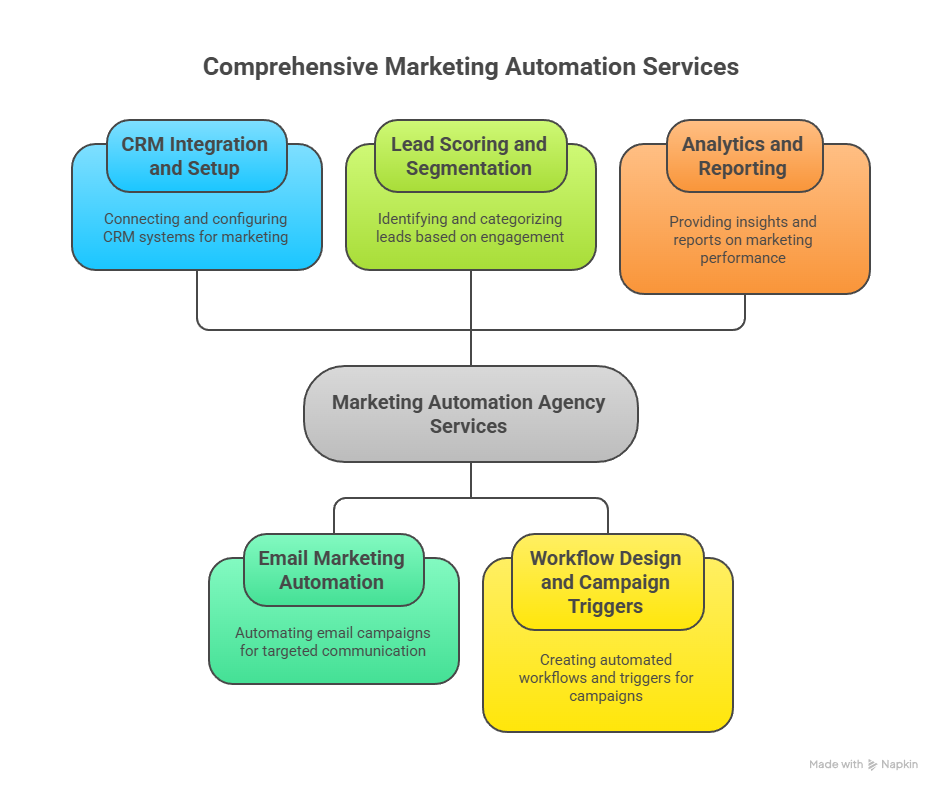
III. Core Services Offered by a Marketing Automation Agency
A great marketing automation agency does more than install software. It acts as your strategic partner, ensuring the technology works toward achieving measurable business outcomes.
Here’s a closer look at the core services you can expect.
1. CRM Integration and Setup
- Connecting your customer relationship management (CRM) system to your marketing platforms.
- Ensuring real-time lead tracking and data flow between marketing and sales.
- Reducing manual entry and misalignment between departments.
2. Email Marketing Automation
- Designing drip campaigns to nurture leads.
- Setting up autoresponders and trigger-based communication.
- Personalizing email content for specific audience segments.
- Monitoring open rates, click-through rates, and conversions.
3. Lead Scoring and Segmentation
- Assigning scores to leads based on behavior (e.g., site visits, downloads, email opens).
- Identifying hot leads faster for sales follow-up.
- Segmenting audiences for targeted, relevant messaging.
4. Workflow Design and Campaign Triggers
- Creating automated sequences that guide prospects from awareness to purchase.
- Using triggers (e.g., form fills, abandoned carts, page visits) to deliver relevant messages.
- Reducing friction in the customer journey.
5. Analytics and Reporting
- Setting up dashboards for campaign performance tracking.
- Monitoring KPIs like conversion rates, ROI, and customer lifetime value.
- Providing insights to continuously optimize campaigns.
Platform Expertise Makes a Difference
Top marketing automation agencies are fluent in multiple platforms, including:
- HubSpot: Best for inbound marketing, CRM integration, and SMB automation.
- Marketo Engage: Ideal for enterprise-level lead scoring and complex workflows.
- ActiveCampaign: Excellent for email automation and SMB scaling.
- Pardot: Strong B2B lead nurturing and Salesforce integration.
The right agency won’t just recommend a tool—they’ll match the platform to your goals, budget, and team capacity.
IV. How Marketing Automation Agencies Drive ROI
One of the most compelling reasons to work with a marketing automation agency is the return on investment (ROI). Automation is not just an operational upgrade — it’s a revenue amplifier.
1. Cost Efficiency and Time Savings
- Automated campaigns reduce the need for manual labor.
- Teams can focus on strategy, not execution.
- Lower operational costs over time.
2. Improved Lead Quality and Conversion Rates
- Automated lead scoring ensures only qualified leads reach sales.
- Segmented campaigns result in higher open and conversion rates.
- Data-driven decisions improve targeting accuracy.
3. Personalization at Scale
- Every lead receives tailored content without additional effort.
- Dynamic content can adapt to behavior and preferences.
- Stronger engagement leads to improved customer loyalty.
4. Real-Life Impact
Example: A mid-sized e-commerce business implemented abandoned cart email automation with the help of an agency. Within three months, cart recovery increased by 40%, resulting in a 27% lift in monthly revenue — without additional ad spend.
📝 FAQs: Early Stage Questions About Marketing Automation
Q1: What is the difference between a marketing automation platform and a marketing automation agency?
A platform provides the tools. A marketing automation agency provides the expertise, strategy, and hands-on execution to ensure those tools deliver measurable results. Think of the agency as the architect behind your automated marketing engine.
Q2: Is marketing automation only for large businesses?
No. Many small and mid-sized businesses use marketing automation to grow faster without adding headcount. Agencies help set up scalable systems that match your size and budget.
Q3: How long does it take to see results from marketing automation?
Most businesses begin to see measurable improvements in engagement and lead conversion within 60 to 90 days after implementation. ROI typically grows as campaigns are optimized over time.
Marketing automation is powerful, but the key to success lies in choosing the right agency and understanding what to expect during implementation.
In the second half of this article, we’ll explore how to evaluate agencies, what a typical implementation roadmap looks like, and the future trends that are reshaping how businesses automate their marketing.
V. Choosing the Right Marketing Automation Agency
Selecting the right marketing automation agency is a critical decision. The right partner can streamline your customer journey, maximize conversions, and increase revenue without overloading your team. The wrong one can lead to poor implementation, wasted ad spend, and missed opportunities.
Here’s a structured way to evaluate potential partners before making a commitment.
Key Criteria to Evaluate Agencies
- Industry Experience:
Look for agencies with proven case studies in your sector. Experience with similar customer journeys means a shorter learning curve. - Platform Expertise:
Check certifications and expertise in platforms like HubSpot, Marketo Engage, or ActiveCampaign. - Strategic Approach:
The best agencies go beyond software setup. They provide long-term roadmaps, testing frameworks, and conversion strategies. - Integration Capabilities:
Seamless integration with your CRM, email platform, and data analytics tools is essential for unified marketing operations. - Support and Optimization:
Look for agencies offering ongoing support, campaign analysis, and performance tuning.
What to Look For in a Marketing Automation Agency
| Criteria | What to Look For | Why It Matters |
| Industry Experience | Case studies in your niche | Faster onboarding and relevant strategies |
| Platform Expertise | Certifications and successful track record | Reduced risk of costly implementation errors |
| Strategic Approach | Custom automation roadmaps, A/B testing strategies | Better ROI and sustained growth |
| Integration Capabilities | Proven ability to sync with CRM, analytics, and ad platforms | Unified, data-driven marketing |
| Support & Optimization | Ongoing performance reviews and campaign tuning | Long-term efficiency and scalability |
Pro Tip: During initial consultations, ask agencies to walk you through a past campaign strategy (not just results). Their explanation often reveals their depth of strategic thinking.
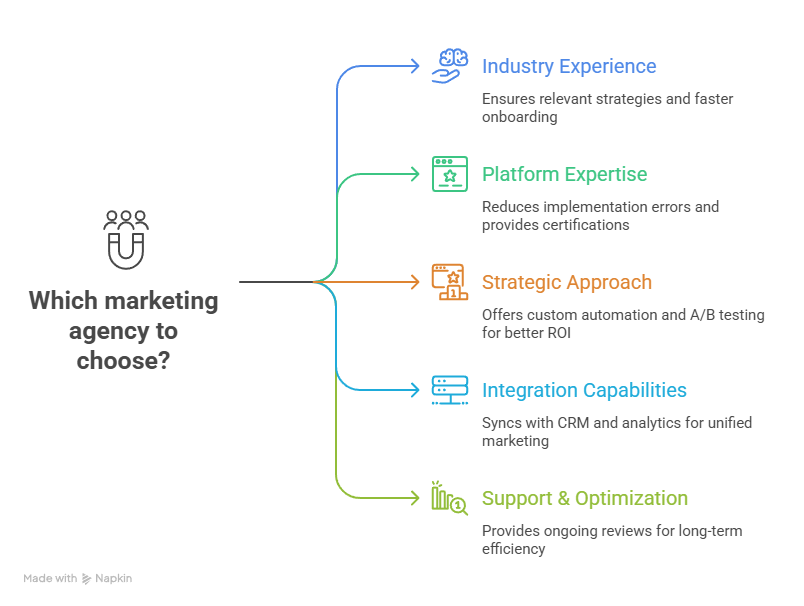
VI. Implementation Roadmap: What to Expect
Once you’ve chosen the right partner, it’s important to understand how the implementation process unfolds. A structured roadmap ensures your investment in automation delivers real business outcomes.
1. Discovery & Goal Setting
- Align on business goals, KPIs, and audience segments.
- Map out your buyer journey and key conversion points.
- Determine the marketing automation platforms that best fit your stack.
2. Platform Integration
- Sync CRM, website, email marketing tools, and analytics.
- Clean up existing data to ensure quality lead scoring and segmentation.
- Set up key triggers (e.g., downloads, form fills, cart abandonment).
3. Campaign Build & Workflow Design
- Design drip campaigns, lead nurturing sequences, and behavioral triggers.
- Create personalized content blocks and dynamic messaging.
- Test each automation flow before launch.
4. Launch and Optimization
- Roll out campaigns in phases to control quality.
- Monitor real-time performance dashboards.
- Optimize based on engagement and conversion data.
Bullet Points: What Businesses Should Prepare for Implementation
- Clean and organized data: Duplicate or incomplete records can hurt performance.
- Clear audience segments: The more defined your personas, the better the targeting.
- Alignment between marketing and sales: Automation thrives when both teams collaborate.
- Defined success metrics: Know how you’ll measure ROI before launch.
- Resource allocation: Have a team member designated to work with the agency.
Timeline Insight: Most marketing automation implementations take 30 to 90 days, depending on complexity and data readiness.
VII. Future Trends in Marketing Automation
The world of marketing automation is evolving rapidly. Agencies at the forefront are integrating AI, predictive analytics, and omnichannel orchestration to stay ahead.
Emerging Trends to Watch
- AI-Driven Personalization:
Automation tools can now predict user behavior, allowing agencies to personalize content dynamically at scale. - Predictive Lead Scoring:
AI models identify high-value prospects earlier, enabling smarter nurturing strategies. - Omnichannel Automation:
Integration across email, SMS, chat, and social platforms ensures consistent messaging everywhere your audience interacts. - Voice and Chat Automation:
As conversational interfaces grow, automation workflows will expand into voice assistants and chatbots for faster customer engagement. - First-Party Data Strategies:
With the decline of third-party cookies, automation platforms will lean heavily on first-party data and customer consent management.
VIII. Advanced FAQs: Choosing and Working with a Marketing Automation Agency
Q4: How much does it cost to hire a marketing automation agency?
Pricing varies widely depending on scope, platform, and complexity. On average:
- Small business automation: $2,000–$5,000/month
- Mid-market or enterprise: $5,000–$15,000+/month
Some agencies also charge a one-time implementation fee.
Q5: How involved does my team need to be during implementation?
Your team plays a key role during the discovery phase, providing data, audience insights, and campaign goals. Once automation is live, your involvement decreases significantly, focusing mainly on strategic input and reporting reviews.
Q6: Can a marketing automation agency work with our existing CRM?
Yes. Top agencies integrate with most major CRMs, including Salesforce Sales Cloud, HubSpot CRM, and Zoho CRM. They ensure clean data flow and eliminate manual data entry.
Q7: What if I already have an in-house marketing team?
An agency doesn’t replace your team — it amplifies their capabilities. While your team focuses on creative strategy and brand voice, the agency manages technical workflows, reporting, and optimization.
Q8: What industries benefit most from marketing automation?
While nearly any sector can benefit, industries that rely on lead generation and nurturing (e.g., real estate, e-commerce, finance, SaaS, healthcare) see the strongest ROI.
Q9: How soon can we measure results after automation goes live?
Early indicators like engagement rates and lead response time can improve within weeks. More significant ROI metrics typically emerge within 60–120 days, once data and workflows mature.
IX. Key Considerations and Best Practices
Eligibility and Readiness Criteria
- You have a clear ideal customer profile (ICP) and segmented audience lists.
- Your business has a steady flow of leads that can be nurtured over time.
- Your CRM or website captures useful data points for automation triggers.
- Your sales and marketing teams are aligned on goals and definitions of a lead.
- You’re committed to iterative optimization, not just a one-time setup.
Important Considerations Before Launch
- Content Readiness: Automation amplifies your messaging. Ensure email copy, landing pages, and offers are in place.
- Lead Quality Over Quantity: Automation can’t fix bad leads. Focus on top-of-funnel targeting first.
- Regulatory Compliance: Follow GDPR, CAN-SPAM, and other regulations depending on your region.
- Internal Training: Empower at least one team member to understand how automations function.
Application & Setup Tips
- Start small: Automate one or two workflows (e.g., welcome emails, abandoned carts) before scaling.
- Test frequently: Regular A/B testing improves campaign performance.
- Keep segmentation dynamic: Update lists and triggers based on real-time behavior.
- Use reporting dashboards actively: Automation only works when monitored and optimized.
- Revisit your workflows quarterly to adapt to market and audience changes.
X. Conclusion:
Partnering with a marketing automation agency isn’t just a tactical decision — it’s a strategic investment in scalability, efficiency, and sustained revenue growth.
Throughout this guide, we’ve covered:
- What marketing automation agencies do and why they matter.
- The services they offer and how they drive ROI.
- How to evaluate and choose the right partner.
- What implementation looks like and how to prepare your team.
- Future trends that will shape marketing automation in the years ahead.
A strong automation partner helps you turn fragmented campaigns into unified growth systems that work while you sleep. Whether your goal is to scale lead generation, increase conversions, or personalize customer engagement, the right agency gives you a powerful competitive edge.
👉 Next Steps:
- Audit your current marketing processes and identify automation opportunities.
- Shortlist 2–3 agencies with proven expertise in your industry.
- Schedule consultations and request strategy overviews, not just pricing.
- Contact reachmarketing.com to learn more about how our team can help build and scale your marketing automation ecosystem.
✅ Quick Recap: Benefits of Partnering with a Marketing Automation Agency
- Save time and resources by automating repetitive tasks.
- Nurture leads more effectively with personalized journeys.
- Gain actionable insights from unified reporting.
- Improve marketing ROI with strategic, data-driven execution.
- Future-proof your business with AI and omnichannel integration.
“Automation isn’t about replacing people — it’s about empowering them to focus on what matters most: strategy, creativity, and growth.”
